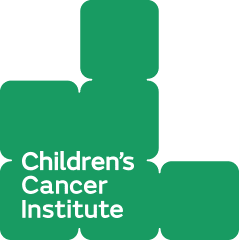
Deciphering the phosphoproteomic landscape of high-risk paediatric and AYA sarcoma
Dr. Emmy Fleuren, Children’s Cancer Institute, Sydney, Australia
Summary
Sarcomas are a diverse group of rare, highly aggressive tumours of the connective tissue that disproportionally affect the young. Despite aggressive treatments, survival in these young patients is limited and side-effects frequently occur, stressing the unmet need to identify novel, tumour specific
treatments. Pinpointing clinically actionable targets is however extremely challenging in these tumours. Widely used genomics interrogations reported very few targetable defects in paediatric sarcomas. Tumour genomics are however only one piece of the puzzle, and the picture
they paint is incomplete. Multiple processes are involved in determining the oncogenic potential of a potential target, including its presence at the RNA (transcriptomics) and protein (proteomics) level. As the actual oncogenic effect is carried out at the protein level, where these proteins also
need to be activated (phosphorylated) to actually have an effect on cell growth or survival, plus it is also these (activated) proteins to which most clinically applicable drugs are directed, it seems only logical to investigate deregulation directly on this level. In this project, we will therefore investigate the complete phosphorylation patterns (pTyr/pSer/pThr) of key effector proteins (kinases) in a diverse set of sarcoma cell lines, patient derived xenograft (PDX) models and patient samples, with the aim to identify clinically actionable targets for young sarcoma patients. As this project is embedded within the ZERO Childhood Cancer National Clinical Trial, in which high-risk (HR) paediatric cancer patients (including sarcomas) are being screened and treated as we speak, the results can have immediate, predictive biomarker driven clinical applications for young sarcoma patients. This is globally unique for HR paediatric and adolescent and young adult (AYA) sarcomas.
Budget
3-year project: postdoctoral researcher (100,000.- p.a.) and associated experimental costs
(90,000.- p.a.)
Total 3 year = 570.000,- AUD
The post-doctoral researcher is crucial to make this project a success. He/she will be responsible to lead and carry out the experimental body of this work, including tissue culture, sample preparation, Mass-Spectrometry analysis, targeted phosphoprofiling and associated in vitro and in vivo validation studies. The post-doc will be embedded within the Translational Tumour Biology team and Personalised Medicine program at Children’s Cancer Institute, Sydney, participate in regular group meetings, write and publish scientific papers and have a pro-active role in facilitatingrapid translation of research findings into the clinic. Experimental costs cover the full body of work associated with this project, from target identification to validation, including tissue culture, sample preparation, Mass-Spectrometry analysis, targeted phosphoprofiling arrays and associated in vitro and in vivo validation studies.
Project description Background and rationale
Sarcomas are a diverse group of rare, highly aggressive tumours of the connective tissue that disproportionally affect the young. Despite aggressive treatments, survival in these young patients is limited and side-effects frequently occur, stressing the unmet need to identify novel, tumourspecific treatments. Pinpointing clinically actionable targets is however extremely challenging in these tumours. Widely used genomics interrogations reported very few targetable defects in paediatric sarcomas [1-3]. For adequate target identification in paediatric sarcomas, there is a critical need for innovative research beyond the standard genomics interrogations.
ZERO Childhood Cancer program – preliminary results
The Zero Childhood Cancer (ZERO) program is testing the feasibility of identifying tailored targeted treatments for high-risk (HR; survival <30%) childhood cancer patients that failed standard treatments, by using a comprehensive precision medicine platform. Apart from genomic interrogations, this program also includes transcriptomic profiling, functional in vitro and in vivo drug testing, all of which are integrated into providing informed clinical recommendations [4,5].
As HR sarcomas are the second largest patient group within the ZERO National Clinical Trial (PRISM) to date (29%; n=71), this provides a unique opportunity to investigate biomarker-driven targeted therapy approaches in paediatric and adolescent and young adult (AYA) sarcoma in a
clinical setting. We recently presented our first exciting interim report on the sarcoma cohort within ZERO PRISM at key national and international sarcoma meetings [6,7]. Using WGS (tumour, germline DNA) and RNASeq analysis, comprehensive molecular profiles have been established for 56 sarcoma patients comprising >13 different histologies. Reportable somatic SNVs, fusions, CNVs and aberrantly expressed genes (RNA) were identified in 45%, 64%, 45% and 64% of patients, respectively. These molecular profiles, supplemented with functional drug profiles when available, resulted in a targeted therapy recommendation for 71% (n=40) of sarcoma patients. Excitingly, for 13 sarcoma patients where treatment recommendations were acted upon, partial responses (PR;n=3) and stable disease (SD, n=1) were reported. Follow-up is ongoing and 7 (54%) of these HR patients are still alive today.
Current clinical problems within ZERO
Although these interim results highlight the feasibility and clinical utility of precision medicine in HR sarcomas, we are not there yet. For 29% of sarcoma patients, no treatment recommendation could be made with our current platform. In addition, even for those sarcoma patients that received a targeted treatment recommendation based on their molecular profile, there is uncertainty whether the identified target is truly driving the disease and whether it is driving this on its own. Primary and secondary treatment resistance still poses a major clinical problem, stressing the need to further refine our methods to accurately identify druggable disease drivers.
Proposed solutions
Our approach to tackling the problem of accurate target identification in young sarcoma patients is to investigate target deregulation directly on the effector level (protein), where we will specifically focus on druggable proteins that are activated, such as kinases, to maximize clinical impact. Assessing the activation state of these druggable, activated kinases has the potential to address critical clinical questions about the effects and pathogenicity of mutations in kinases identified in ZERO, and whether gene/RNA overexpression is indicative of protein activation. In addition, it has the potential to pinpoint actionable targets in the remaining 29% of sarcoma patients for whom we are currently unable to provide targeted treatment recommendations within ZERO. Just because a target is not deregulated on the genome or transcriptome level, does not mean it is not deregulated at the protein level, as it is well-known that protein aberration can occur on multiple levels, beyond DNA mutations/copy number or RNA abundance.
Phosphoproteomics – preliminary results
In the current proposal, we build on our previous teamwork in which we utilized a global mass spectrometry (MS)-based tyrosine phosphorylation screening approach to profile tyrosine kinase signalling networks in a diverse set of sarcomas [8]. Our unique and detailed insights into these networks showed that particularly the paediatric and AYA sarcomas did not cluster together into their designated histologic classifications, highlighting how knowledge of histologic subtype may be insufficient for assigning targeted treatments. This technique also allowed us to identify novel targets for therapy, including the receptor tyrosine kinase (RTK) ALK as a completely novel and actionable target in a subset of synovial sarcomas. In this previous study, we only focussed on tyrosine kinases (pTyr). Serine and threonine phosphorylated kinase targets (pSer/pThr) are however also increasingly clinically actionable. Various pSer/pThr kinases have recently been implicated in paediatric sarcoma, but a complete view of deregulated phosphorylation patterns in these tumours is lacking.
In this study, we will therefore, for the first time, investigate the complete paediatric/AYA sarcoma phosphoproteome (pTyr/pSer/pThr), including sarcoma subtypes that have never been profiled before, by Mass-Spectrometry (MS; unbiased) and multiplex arrays (targeted), and address its potential for additional target identification and/or target validation. We will focus on the activation status of the most druggable class of protein targets, the kinases, to maximise clinical utility. The ultimate aim is to integrate this novel phosphoproteomic screening platform into the existing ZERO platform.
Aim: To investigate the sarcoma phosphoproteome (pTyr/pSer/pThr) by large-scale Mass- Spectrometry and targeted multiplex arrays to address its potential for additional target identification and/or target validation and integration in the ZERO platform, with a focus on protein kinases.
Feasibility: We have successfully completed comparable projects in similar timeframes (1-3 years), including phosphoproteomics assays, where we constructed and integrated multidimensional datasets (genomics/proteomics/functional genomics), reported a novel census of kinase drivers in cancer, and identified and validated novel targets in for example synovial sarcomas [8-10]. Innovation: The phosphoproteome, beyond a small number of signalling pathways, is poorly understood, especially in rare tumours such as paediatric sarcoma. No study exists in such a diverse set of HR paediatric sarcoma with the capacity to integrate the phosphoproteomic profiles with gene mutation profiles (genomics), expression profiles (transcriptomics), functional in vitro and in vivo drug studies and even patient outcome and patient’s response to targeted therapies. Embedding of this project within the ZERO PRISM study provides a remarkable opportunity to explore the unknown biology of paediatric sarcomas. This is the critical step on the way to more effective treatments.
poorly understood, especially in rare tumours such as paediatric sarcoma. No study exists in such a diverse set of HR paediatric sarcoma with the capacity to integrate the phosphoproteomic profiles with gene mutation profiles (genomics), expression profiles (transcriptomics), functional in vitro and in vivo drug studies and even patient outcome and patient’s response to targeted therapies. Embedding of this project within the ZERO PRISM study provides a remarkable opportunity to explore the unknown biology of paediatric sarcomas. This is the critical step on the way to more effective treatments.
References
1. Crompton BD et al. The genomic landscape of pediatric Ewing sarcoma. Cancer Discov. 2014;4(11):1326-41.
2. Shern JF, et al. Comprehensive genomic analysis of rhabdomyosarcoma reveals a landscape of alterations affecting
a common genetic axis in fusion-positive and fusion-negative tumors. Cancer Discov. 2014;4:216 231.
3. Cancer Genome Atlas Research Network. Comprehensive and Integrated Genomic Characterization of Adult
Soft Tissue Sarcomas. Cell. 2017;171(4):950-65 e28.
4. Lau L, et al. Pilot study of a comprehensive precision medicine platform for children with high-risk cancer. Journal
of Clinical Oncology 35, no 15_suppl (May 2017) 10539-10539
5. Mould E, et al. Zero Childhood Cancer: A comprehensive precision medicine platform for children with high-risk
cancer. Proceedings of the American Association for Cancer Research Annual Meeting 2018; Cancer Res
2018;78(13 Suppl): Abstract nr LB-138.
6. Fleuren et al. PRecISion Medicine for children with cancer (PRISM): Focus on sarcoma. Presented at Australian and
New Zealand Sarcoma Association (ANZSA) Annual Scientific Meeting, Canberra, Oct 2019.
7. Fleuren et al. Personalised medicine for high-risk paediatric and AYA sarcoma patients. Presented at Connective
Tissue Oncology Society (CTOS) Annual Meeting, Tokyo, Nov 2019.
8. Fleuren*, Vlenterie* et al. Phosphoproteomic Profiling Reveals ALK and MET as novel actionable targets across
synovial sarcoma subtypes. Cancer Res. 2017;77(16):4279-92.
9. Jones*, Fleuren* et al. ATR Is a therapeutic target in synovial sarcoma. Cancer Res. 2017;77(24):7014-26.
10. Fleuren*, Zhang* et al. The kinome ‘at large’ in cancer. Nat Rev Cancer. 2016;16(2):83-
